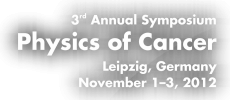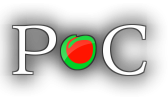|
|
| The scientific program consists of invited and contributed
talks as well as a poster session. All participant will receive a printed
program booklet containing the detailed schedule including all abstracts
at the conference. You may also download this program
booklet as PDF file.
However, please pay attention to our constantly updated web schedule
below accounting for last-minute rearrangements. Particularly,
due to the impact of hurricane Sandy, some schedule changes regarding talks
of speakers from the USA might become necessary.
Talks:
All talk sessions take place at Center for Biotechnology
and Biomedicine (BBZ) in the large auditory (ground floor, SR 1.1 to
1.3). Contributed talks are allocated 15 min (including discussion), whereas
invited talks are allocated 20 min plus 10 min discussion.
Posters:
The session for poster presentation is on Thursday, November 1, 2012
at 19:00 at Center for Biotechnology and Biomedicine
(BBZ) in the foyer. During this session snacks and fingerfood will be provided
for all. The poster boards will be marked with the number according to
the scientific program. Posters must fit within a rectangle 90 cm wide
and 120 cm high (DIN A0), portrait format. The material necessary to mount
the poster (pins or "Poster Strips") will be provided. |
|
 |

|
13:00 13:15
|
Welcome / Opening
Beate A. Schücking (Rector
of the University of Leipzig) |
| Session I: Biomechanics of Cell Adhesion and Gene Expression |
|
13:15 13:45
|
Do tumor cells care about physics?
Josef A. Käs (University of
Leipzig, Germany) |
|
13:45 14:15
|
Active cell shape control by contractile
actin-myosin networks
Gijsje Koenderink (FOM Institute
AMOLF, The Netherlands) |
|
14:15 14:45
|
Force-dependent and -independent
integrin regulation of ROS-production
Staffan Johansson (Uppsala University,
Sweden) |
|
14:45 15:15
|
Coffee break |
|
15:15 15:45
|
Extracellular matrix models and
the cytoskeleton
Florian Rehfeldt (Georg August
University of Göttingen, Germany) |
|
15:45 16:15
|
Surface changes on dying tumor
cells instruct the immune system
Martin Herrmann (University Hospital
Erlangen, Germany) |
|
16:15 16:45
|
The keratin desmosome connection:
Crucial player in tissue integrity and malignancy
Thomas M. Magin (University of
Leipzig, Germany) |
|
16:45 17:15
|
Reprogramming cellular mechanosensing
by hyaluronic acid and its receptors
Paul Janmey (University of Pennsylvania,
USA) |
|
17:15 17:30
|
Higher
ordered actin bundle assembly induced by counterions and crowding agents
Jörg Schnauß (University
of Leipzig, Germany) |
|
17:30 17:45
|
Quantification
of live keratin network dynamics
Marcin Moch (RWTH Aachen University,
Germany) |
|
17:45 18:00
|
Keratins
are major determinants of migration and invasion by influencing adhesion
and cell stiffness
Kristin Seltmann (University of
Leipzig, Germany) |
| Poster Session |
|
19:00
|
01
|
Native root
extract of Linum usitatissimum induces cytoskeletal remodeling in
the breast cancer cell line MCF-7
Nadja Engel (University of Rostock,
Germany) |
|
02
|
The role of
cellular adhesion for compartmentalization and its impact on tumor spreading
Steve Pawlizak (University of Leipzig,
Germany) |
|
03
|
Binding of
hyaluronan to sulfated glycosaminoglycans in CD44
Maria Schönberg (University
of Leipzig, Germany) |
|
04
|
Quantitative
characterization of biomaterials and their interaction with living cells
by AFM
Torsten Müller (JPK Instruments
AG, Germany) |
|
05
|
3D topology
of tumor cell colonies on 2D substrates
Janina Lange (University of Erlangen-Nuremberg,
Germany) |
|
06
|
Blood platelets-
a model system for understanding cellular mechanics
Aishwarya Paknikar (Georg August
University of Göttingen, Germany) |
|
07
|
Modulation
of cell adhesion by non-covalently attached ligands
Andreas Müller (University
of Leipzig, Germany) |
|
08
|
Circular ruffle
dynamics on fibroblast cells
Erik Bernitt (University of Bremen,
Germany) |
|
09
|
Cell adhesion
on different materials in the presence or the absence of fetal bovine serum
Martina Verdanova (Charles University
Prague, Czech Republic) |
|
10
|
Blood platelets
as a model system for cell substrate interactions
Rabea Sandmann (Georg August University
of Göttingen, Germany) |
|
11
|
Inherently
slow and weak forward forces of neuronal growth cones measured by a drift-stabilized
atomic force microscope
Thomas Fuhs (University of Leipzig,
Germany) |
|
12
|
Mechanics
of collagen gels what cells feel
Julian Steinwachs (University Erlangen-Nuremberg,
Germany) |
|
13
|
The evolution
of collagen mechanics in response to large amplitude loading
Stefan Münster (University
Erlangen-Nuremberg, Germany) |
|
14
|
The nanomechanical
signature of breast cancer
Marija Plodinec (University of
Basel, Switzerland) |
|
15
|
ß1 integrins
restrict the growth of foci and spheroids
Rajesh Gupta (Uppsala University,
Sweden) |
|
16
|
Sensitive
control of active gel contraction
Felix Keber (TU Munich, Germany) |
|
17
|
Virtual probing
of cells with microscopic imaging and computational modeling
Evgeny Gladilin (German Cancer
Research Center, Heidelberg, Germany) |
|
18
|
Biomechanical
studies on human primary cervix cells
Anatol Fritsch (University of Leipzig,
Germany) |

| Session II: Cell Migration and Forces I |
|
08:30 09:00
|
The role of mechano-sensing and matrix geometry
in cancer invasion
Erik Sahai (London Research Institute,
UK) |
|
09:00 09:30
|
Spatially and temporally coordinated processes
of cells at molecular to cellular scales
Joachim P. Spatz (Max Planck Institute
for Intelligent Systems, Germany) |
|
09:30 10:00
|
Assembly and role of
the nuclear intermediate filament proteins for nuclear structure and stability
Harald Herrmann
(German Cancer Research Center, Heidelberg, Germany)
Mechanical regulation of tumor reversion
Daniel A.
Fletcher (University of California, Berkeley, USA)
|
|
10:00 10:30
|
Coffee break |
|
10:30 11:00
|
Biomechanical properties of cancer cells determine
their aggressiveness
Claudia T. Mierke (University of
Leipzig, Germany) |
|
11:00 11:30
|
Self-organization of the actin cytoskeleton:
Physical mechanisms and signaling pathways
Alexander Bershadsky (Weizmann
Institute of Science, Israel) |
|
11:30 12:00
|
Mechanical regulation of adhesive bonds
David E. Boettiger (University
of Pennsylvania, USA) |
|
12:00 12:15
|
The percolation
transition of transportation networks as a universal gauge for tumor vascularization
Hans-Günther Döbereiner
(University of Bremen, Germany) |
|
12:15 12:30
|
Forces in cellular
growth and division
Jörn Hartung (Max Planck Institute
for Dynamics and Self-Organisation, Göttingen, Germany) |
|
12:30 14:30
|
Lunch break |
| Session III: Cell Migration and Forces II |
|
14:30 15:00
|
Significance of the mechanical properties of
the cell nucleus in cell migration and transit through narrow constrictions
Jan Lammerding (Cornell University,
USA) |
|
15:00 15:30
|
Predictive mechanical models for dynamic tissue
remodeling
M. Lisa Manning (Syracuse University,
USA) |
|
15:30 15:45
|
Assembly of
cytoplasmic intermediate filament proteins
Norbert Mücke (German Cancer
Research Center, Germany) |
|
15:45 16:00
|
In vivo
imaging of lysyl oxidase by fluorine-18 labeled substrate-based radiotracers
Manuela Kuchar (Helmholtz-Zentrum
Dresden-Rossendorf, Germany) |
|
16:00 16:15
|
Temperature-dependent
assembly properties of keratin 8/18
Ines Martin (Ulm University, Germany) |
|
16:15 16:30
|
Optical breast
tissue pre-screening for the identification of cancer risk and presence
of malignancies
Lothar Lilge (University of Toronto,
Canada) |
|
16:30 17:00
|
Coffee break |
|
17:00 17:30
|
Boron clusters in cancer
therapy
Evamarie Hey-Hawkins
(University of Leipzig, Germany) |
|
17:30 18:00
|
Beyond conventional limits to cancer: Where
can a physical sciences perspective fit in?
Larry A. Nagahara (National Cancer
Institute, USA) |
|
19:00
|
Get together for invited speakers |

| Session IV: Membrane Mechanics, Cytoskeletal Dynamics,
and Tumor Progression |
|
08:00 08:30
|
Mechanics of contractile actomyosin bundles
Philippe Marcq (Institute Curie,
France) |
|
08:30 09:00
|
Mechanosensitivity and motility of cellular
aggregates
Françoise Brochard-Wyart
(Institute Curie, France) |
|
09:00 09:30
|
Extrinsic and intrinsic force regulation of
tumor progression
Valerie M. Weaver (University of
California, San Francisco, USA) |
|
09:30 10:00
|
The nanomechanical signature of breast cancer
Roderick Y. H. Lim (University
of Basel, Switzerland) |
|
10:00 10:15
|
Nonlinear
fibrin mechanics and its alterations by platelets
Louise Jawerth (Harvard University,
USA) |
|
10:15 10:45
|
Coffee break |
|
10:45 11:15
|
Dynamic motility and F-actin network structure:
Insights from mathematical modeling
Martin Falcke (Max-Delbrück-Center
for Molecular Medicine, Mathematical Cell Physiology, Germany)
Coordination of locomotory and invasive protrusions during migration
and dissemination of tumor cells in breast tumors
John S. Condeelis (Albert
Einstein College of Medicine, USA)
|
|
11:15 11:45
|
Regulation of focal adhesion maturation by
the actin cytoskeleton
Margaret Gardel (University of
Chicago, USA) |
|
11:45 12:15
|
Cell motility and cytoskeleton assembly
Julie Plastino (Institute Curie,
France) |
|
12:15 12:45
|
Ruthenium(II) polypyridyl complexes as carriers
for DNA delivery
Avinash S. Kumbhar (University
of Pune, India) |
|
12:45 13:15
|
Lamin-A levels limit 3D-migration but protect
against migration-induced apoptosis
Dennis E. Discher (University of
Pennsylvania, USA) |
|
13:15 13:30
|
Prospective
end |
|
|



